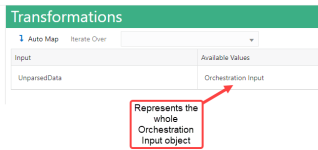AndrewCoutts
Member
Hello,
I'm trying to create an orchestration that will allow me to receive the following input but am unsure how to handle it.
I think this is something that I will need to use Groovy/JRuby to parse.
When I analyse the incoming post it looks like the content-type is x-www-form-urlencoded
This is the body of what is getting posted
[('ITEM-DESCRIPTION[1]', 'Valve'), ('ITEM-NUMBER[1]', '564646'),('ITEM-DESCRIPTION[2]', 'O-RING'), ('ITEM-NUMBER[2]', '123123')]
Does anyone know how would get this array of information into my orchestration so I can loop through the elements of this array?
I'm trying to create an orchestration that will allow me to receive the following input but am unsure how to handle it.
I think this is something that I will need to use Groovy/JRuby to parse.
When I analyse the incoming post it looks like the content-type is x-www-form-urlencoded
This is the body of what is getting posted
[('ITEM-DESCRIPTION[1]', 'Valve'), ('ITEM-NUMBER[1]', '564646'),('ITEM-DESCRIPTION[2]', 'O-RING'), ('ITEM-NUMBER[2]', '123123')]
Does anyone know how would get this array of information into my orchestration so I can loop through the elements of this array?



